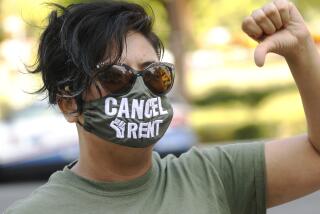Vending Law Adopted, 4-1, by Anaheim
- Share via
When and how street vendors hawk their wares in Anaheim will be regulated under a new ordinance adopted Tuesday--an ordinance that the predominantly Latino vendors criticized as discriminatory.
On a 4-1 vote, the Anaheim City Council replaced a law written in a few sentences with one containing 12 pages of regulations.
Councilman Fred Hunter, in his first day on the job, voted against the law, calling it overregulation.
“God forbid if we continue in this city to overregulate,” Hunter said.
Although the vendors won a major concession from the city in the form of a clause that allows them to use music and horns to attract customers, they said they lost on many other points. Among those regulations the vendors criticized Tuesday were:
- A requirement that vendors pick up and deposit in trash receptacles, in their own vehicles, any paper, cups, wrapper, litter or other refuse of any kind that came from merchandise supplied by them and left within 25 feet of the vehicle. The vendors said they would be willing to cooperate but don’t want to be responsible for “cleaning the streets,” said Pedro Vasquez, president of a union of vendors.
- The restricting of vending from 9 a.m. to 8 p.m. Vendors would like to sell until 9 p.m. during the summer months.
- A requirement that vendors carry $250,000 insurance for bodily injury for each person, $500,000 per occurrence and $100,000 property damage coverage per occurrence. Vendors criticized the amounts as unaffordable, while the city called them a necessity.
The new ordinance also bans paleteros-- vendors who use pushcarts to sell their goods, mostly ice cream. They are a common sight in some Latino neighborhoods during the summer.
Late last year Anaheim code enforcement officers began cracking down on vendors at the request of residents in areas with apartment complexes frequented by the street merchants. Residents complained of excessive noise, traffic and litter.
To clear the area of vendors, city code enforcement officers used a 1926 local law to keep them out of apartment areas. But when the vendors sued, the city attorney said he discovered in his research that the city may have been acting against state law in banning them from apartment neighborhoods.
That lawsuit, which still is pending, now is moot, according to the city attorney, because the city has passed the new ordinance, which will become effective 30 days from Tuesday.
Salvador Sarmiento, an attorney for the vendors, said Tuesday that he next plans to file individual lawsuits against the city to recover money the vendors lost during the months the city banned them from apartment neighborhoods, their most lucrative sales areas.
Alfonso Gomez, who sells ice cream, said the new regulations are targeted at him and other small business people who are Latino. Calling the ordinance “ridiculous,” Gomez said the council adopted the law “because we are Mexicans, we are Latino, that’s why.”
The council has disputed claims of discrimination.
Chaotic Alternative Cited
“This is something we have to control. It’d be nice to not have any rules and regulations. But when that happens, that creates chaos,” Mayor Pro Tem Irv Pickler said.
Sarmiento said the ordinance could be interpreted as not applying to larger companies with a fleet of lunch trucks because of a clause exempting delivery people “where such goods or merchandise has been ordered in advance . . . from any business located at a permanent location. . . .”
But City Atty. Jack L. White said the ordinance will apply to the larger companies with lunch trucks as well as the vegetable and ice cream operations with one or two trucks. He said the clause Sarmiento cited is the “Domino Pizza exemption,” one that applies only to deliveries such as pizza, not lunch trucks.
More to Read
Sign up for Essential California
The most important California stories and recommendations in your inbox every morning.
You may occasionally receive promotional content from the Los Angeles Times.










